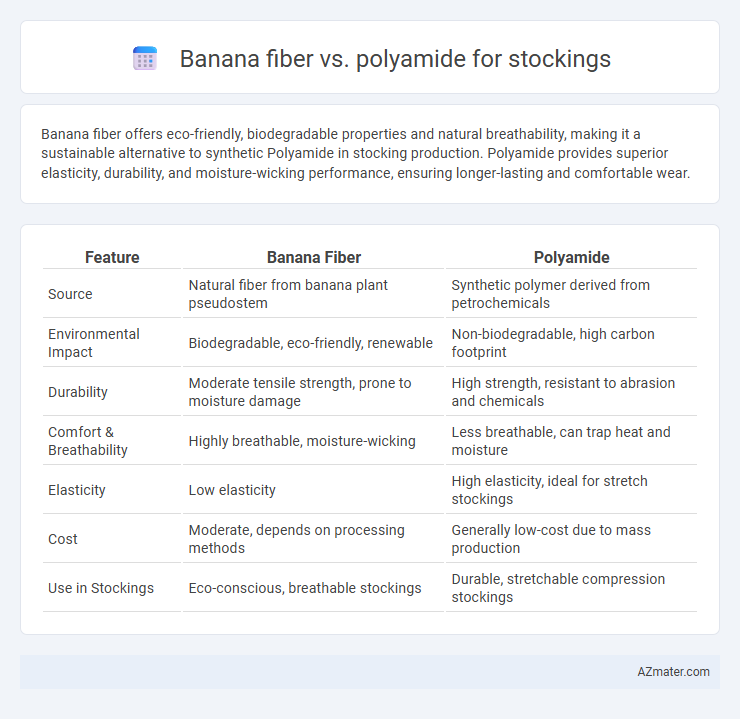Banana fiber offers eco-friendly, biodegradable properties and natural breathability, making it a sustainable alternative to synthetic Polyamide in stocking production. Polyamide provides superior elasticity, durability, and moisture-wicking performance, ensuring longer-lasting and comfortable wear.
Table of Comparison
| Feature | Banana Fiber | Polyamide |
|---|---|---|
| Source | Natural fiber from banana plant pseudostem | Synthetic polymer derived from petrochemicals |
| Environmental Impact | Biodegradable, eco-friendly, renewable | Non-biodegradable, high carbon footprint |
| Durability | Moderate tensile strength, prone to moisture damage | High strength, resistant to abrasion and chemicals |
| Comfort & Breathability | Highly breathable, moisture-wicking | Less breathable, can trap heat and moisture |
| Elasticity | Low elasticity | High elasticity, ideal for stretch stockings |
| Cost | Moderate, depends on processing methods | Generally low-cost due to mass production |
| Use in Stockings | Eco-conscious, breathable stockings | Durable, stretchable compression stockings |
Introduction to Banana Fiber and Polyamide in Stocking Production
Banana fiber, derived from the pseudostems of banana plants, is an eco-friendly, biodegradable material known for its strength, natural sheen, and moisture-wicking properties, making it a sustainable choice in stocking production. Polyamide, commonly known as nylon, is a synthetic polymer widely used in stockings for its elasticity, durability, and smooth texture, providing a snug fit and resistance to wear. Combining banana fiber's eco-conscious appeal with polyamide's performance characteristics offers innovative possibilities in the development of comfortable, durable, and sustainable stockings.
Material Origins: Natural vs Synthetic Fibers
Banana fiber, derived from the pseudostems of banana plants, offers an eco-friendly alternative to traditional stocking materials due to its natural origin and biodegradability. In contrast, polyamide, a synthetic fiber made from petrochemical compounds, provides superior elasticity and durability but raises environmental concerns related to non-renewable resources and microplastic pollution. Choosing banana fiber supports sustainability through renewable plant-based materials, whereas polyamide emphasizes performance with synthetic innovation.
Sustainability and Environmental Impact
Banana fiber is a biodegradable and renewable resource derived from agricultural waste, significantly reducing environmental pollution and deforestation compared to polyamide, which is petroleum-based and non-biodegradable, contributing to microplastic pollution in oceans. The production of banana fiber consumes less energy and water, lowering its carbon footprint and supporting a circular economy through waste valorization. In contrast, polyamide manufacturing involves fossil fuels and emits greenhouse gases, making banana fiber a more sustainable and eco-friendly alternative for stocking materials.
Comfort and Skin Sensitivity
Banana fiber offers superior breathability and natural moisture-wicking properties, making it highly comfortable and ideal for sensitive skin in stockings. Polyamide provides durability and elasticity but may trap heat and moisture, potentially causing irritation for those with sensitive skin. Choosing banana fiber stockings enhances comfort through hypoallergenic and eco-friendly attributes, reducing skin irritation risks significantly.
Durability and Wear Resistance
Banana fiber exhibits natural durability and moderate wear resistance, making it suitable for eco-friendly stockings with a soft texture but limited longevity under heavy use. Polyamide, a synthetic fiber, offers superior durability and high wear resistance, ensuring stockings maintain shape and strength through repeated wear and washing cycles. The choice between banana fiber and polyamide balances sustainability with performance, where polyamide excels in durability and banana fiber provides biodegradable advantages.
Breathability and Moisture Wicking Properties
Banana fiber offers superior breathability compared to polyamide, allowing better air circulation that keeps feet cool and dry. Its natural moisture-wicking properties efficiently absorb and release sweat, reducing odor and enhancing comfort during prolonged wear. In contrast, polyamide, while durable, tends to retain moisture and provides less ventilation, which can lead to discomfort in warm or humid conditions.
Elasticity and Fit Comparison
Banana fiber stockings offer moderate elasticity due to the natural cellulose structure, providing a comfortable, breathable fit with limited stretch compared to synthetic materials. Polyamide stockings exhibit superior elasticity and resilience, ensuring a snug, form-fitting shape that maintains its fit over time. The natural fibers in banana fiber enable better moisture absorption and comfort, while polyamide's enhanced stretchability supports durability and a consistent, tight fit.
Color Fastness and Dyeing Capabilities
Banana fiber exhibits excellent dye absorption due to its lignin and hemicellulose content, resulting in rich, vibrant colors with superior color fastness compared to polyamide. Polyamide fibers, while offering good dyeability with synthetic dyes, often show quicker fading under UV exposure and repeated washing. The natural composition of banana fiber enhances dye retention and eco-friendly dyeing processes, making it a sustainable choice for long-lasting colored stockings.
Cost and Market Availability
Banana fiber stockings generally offer a cost-effective alternative to polyamide due to the low price of natural fibers and sustainable cultivation methods. Polyamide stockings dominate the market with widespread availability and mass production, resulting in consistent pricing but often higher environmental costs. While banana fiber is still emerging with limited market presence, its affordability and eco-friendliness make it an attractive option compared to the more established, commercially available polyamide.
Consumer Preferences and Future Trends
Banana fiber stockings offer enhanced sustainability and biodegradability, appealing to eco-conscious consumers seeking natural alternatives to conventional polyamide options. Polyamide stockings remain favored for their superior elasticity, durability, and smooth texture, ensuring a consistent fit and long-lasting wear. Future trends indicate a growing consumer shift towards blended materials combining banana fiber's environmental benefits with polyamide's performance qualities to balance comfort, sustainability, and durability in stocking fabrics.

Infographic: Banana fiber vs Polyamide for Stocking
 azmater.com
azmater.com